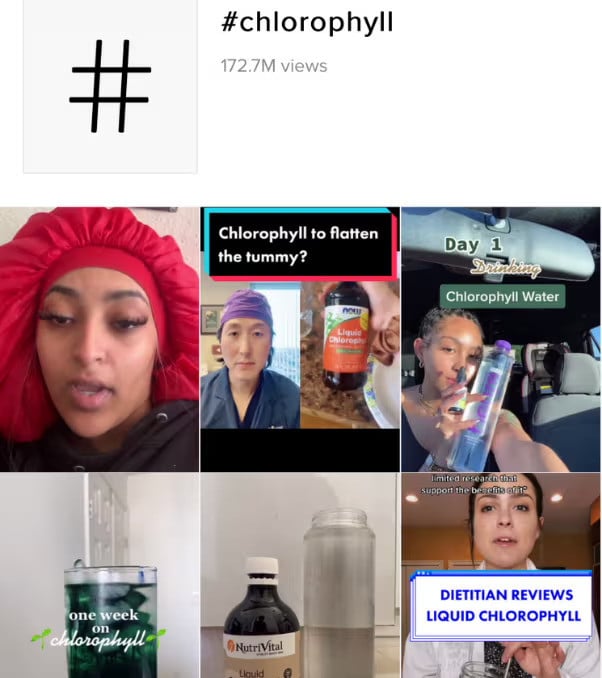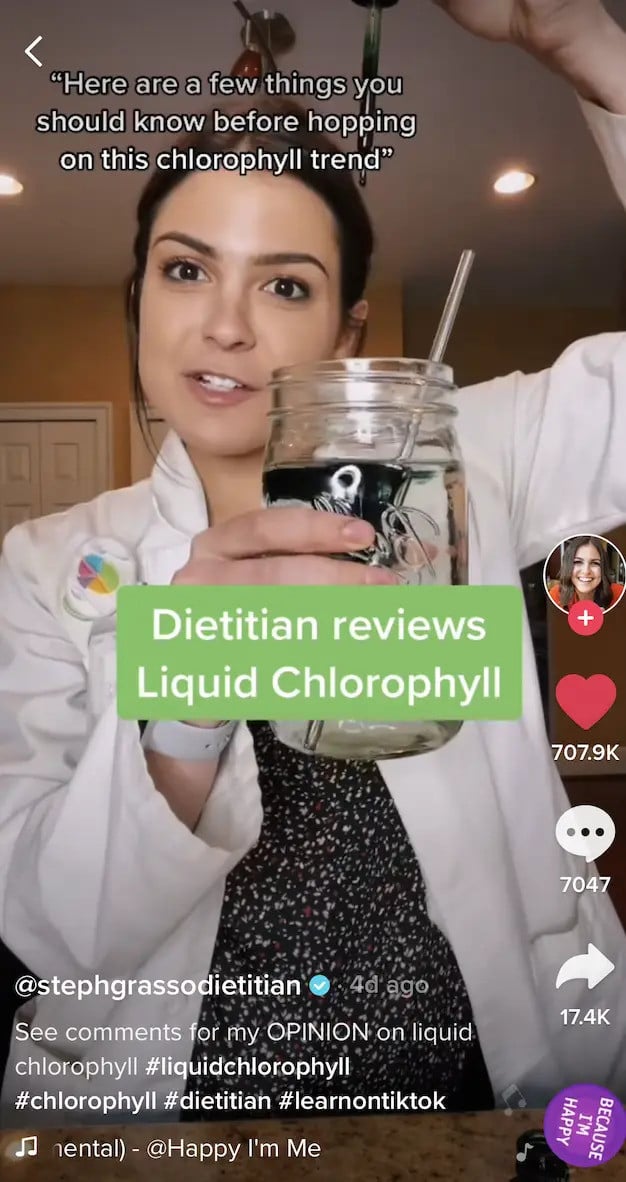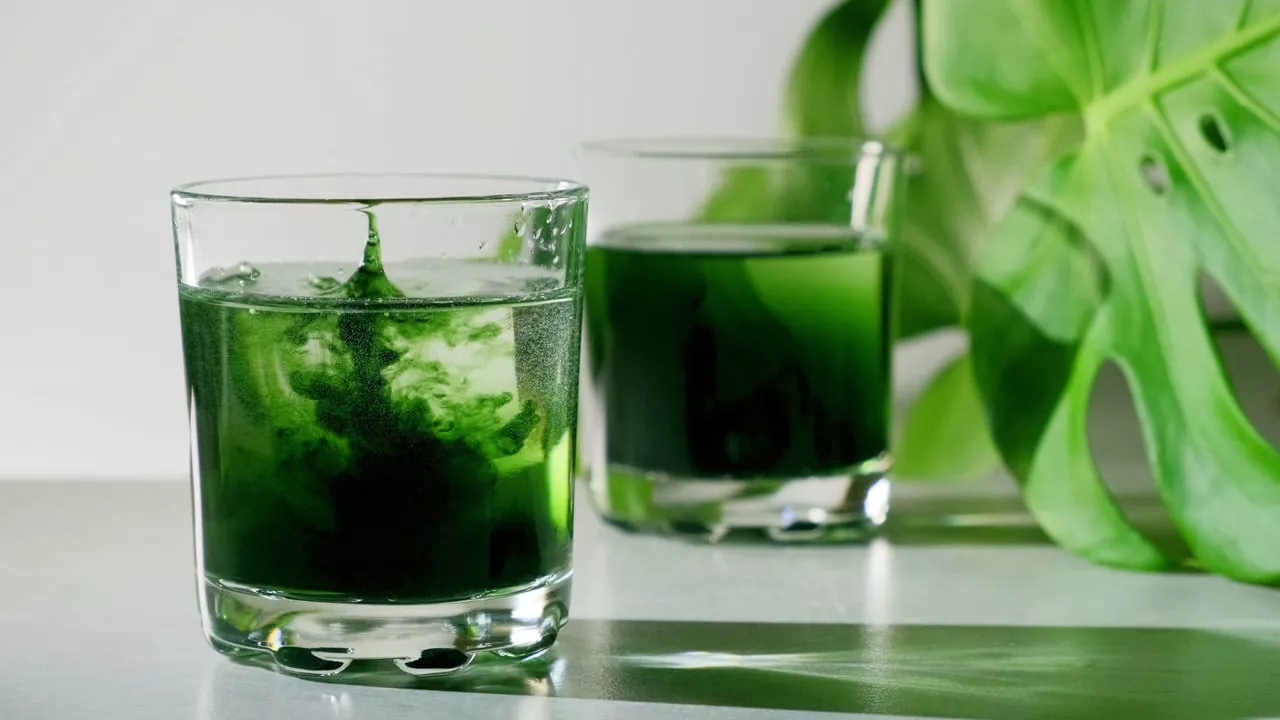Lately, chlorophyll water has been all over TikTok, with wellness enthusiasts praising its variety of benefits. If you recall biology class, you'll know chlorophyll is what gives plants their green color and helps them in photosynthesis. But what can a plant’s green pigment possibly do for human health? Wellness influencers tout liquid chlorophyll as a miracle for everything from acne to body odor.

Some of these claims seem believable, while others may be too good to be true. So, we consulted registered dietitians to give their expert opinion on the topic. Read on to learn about chlorophyll water, its potential benefits, and whether it’s worth adding to your routine.
What Is Chlorophyll Water?
Chlorophyll is the natural pigment responsible for the green color in plants, aiding them in photosynthesis. Found in green vegetables like spinach, kale, and parsley, chlorophyll plays a role in converting sunlight into energy. The chlorophyll water you've seen on social media is actually a synthetic form called chlorophyllin, which is extracted from plants and modified for human consumption. This altered form, bound to copper rather than magnesium, is supposedly easier for the body to absorb. But don’t be fooled by influencers—there’s no solid evidence that this modified form improves absorption any better than simply eating vegetables.
The Benefits of Chlorophyll Water
Fights Inflammation
Chlorophyll is often praised for its anti-inflammatory properties. A 2012 study showed that chlorophyll and its derivatives might help reduce inflammation and related diseases. It may also reduce acne inflammation when applied topically or taken internally. However, most studies so far have been conducted on animals, so further research is needed to understand its effects on humans fully.
Antioxidant Properties
The claim that chlorophyll acts as an antioxidant, protecting the body from free radicals and oxidative stress, is among the most supported by scientific studies. Research has demonstrated that chlorophyll and its derivatives have antioxidant effects, but again, most studies have involved animals. While it’s promising, more research on humans is needed to verify these effects.
Aids Natural Detoxification
Chlorophyll’s molecular structure is similar to hemoglobin, the protein in red blood cells, leading some to believe that it supports detoxification and oxygenation in the body. Studies suggest that chlorophyll could help detoxify the body from heavy metals and harmful substances like aflatoxins (toxins from mold). But again, these claims require more research in humans before definitive conclusions can be made.
Anti-Aging Properties
Some believe that chlorophyll may help slow the signs of aging due to its rich content of vitamins A, C, and E, which promote skin repair and regeneration. One small study in 2015 showed that participants who applied chlorophyllin gel to their skin saw improvements in sun-damaged areas. While this research is still preliminary, there are no downsides to trying it as long as you don’t have any allergies or skin sensitivities.
The Risks of Chlorophyll Water
Chlorophyll water is generally safe, with no established upper toxicity limits. However, pregnant or breastfeeding women may want to avoid it due to insufficient research on its safety. Those taking certain medications, such as methotrexate (for cancer, psoriasis, or rheumatoid arthritis), or those already consuming copper through a multivitamin, should also steer clear, as chlorophyllin contains high amounts of copper.
Additionally, if you frequently drink chlorophyll water, you may become more sensitive to sunlight, so be vigilant about sun protection. Certain medications, particularly those for acne, can increase photosensitivity as well, so it’s best to consult your doctor before starting liquid chlorophyll.
Lastly, some users report mild gastrointestinal discomfort, such as nausea or diarrhea, after consuming liquid chlorophyll. To avoid this, start with small amounts and consult your healthcare provider for advice.
Is Chlorophyll Water Actually Good for You?
While chlorophyll water may offer some benefits, it certainly isn’t a cure-all. Most of the claims surrounding it are not well supported by scientific research. If you’re already eating a healthy, balanced diet with plenty of green vegetables, you’re probably getting enough chlorophyll naturally. Adding chlorophyll water to your routine may help keep you hydrated, but it’s not going to replace the benefits of a nutritious diet and lifestyle.

Focus on getting your chlorophyll from natural sources, like leafy greens, to reap additional benefits such as fiber, vitamins, and minerals that aid in digestion and overall health.
Chlorophyll Supplements vs. Greens Powders
Chlorophyll supplements differ from greens powders, which typically include a mix of dried vegetables, fruits, and algae like chlorella and spirulina. While chlorella and spirulina are rich in chlorophyll, they also offer other nutrients, like protein and vitamins (such as B12 in chlorella). Both have antioxidant and anti-inflammatory properties that contribute to their health benefits.
Each option—whether supplements, powders, or whole foods—offers unique advantages, but the best approach is to diversify your intake. Always check the ingredients and quality of any supplement you try and remember that no supplement can replace a well-rounded diet.
The Final Takeaway
While drinking chlorophyll water likely won’t hurt you, it may not be worth the hype either. Those who don’t eat enough vegetables might benefit from it, but if you already consume a balanced diet rich in green leafy vegetables, you won’t notice much difference. Experts recommend sticking with real greens for the most significant health benefits, as supplements are just that—supplements, not replacements for a healthy lifestyle.









COMMENTS
Comments are moderated and generally will be posted if they are on-topic and not abusive.
For more information, please see our Comments FAQ